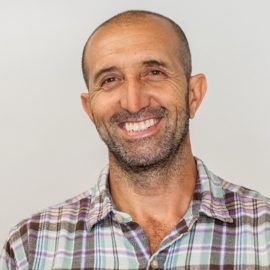EPISODE #66 – ADDICTION OF AVOIDANCE
Tim Bishop2021-09-01T21:27:15+00:00ADDICTION OF AVOIDANCE
Psychotherapist Koorosh Rassekh joins Tim today to reframe a major point of news in the world: addiction.
Through this podcast Koorosh details his experiences of addiction through a candid reflection of his life and the research he has dedicated his life to. To him, to understand addiction is to understand the pain and avoidance people are experiencing and inflicting on themselves. In order to break the cycle, the importance of a healthy self-narrative needs to be made, and a reimagining of why one is an addict.
In this episode you will learn and dive into:
- (3:33) – Adjusting to Isolation
- (8:00) – Koorosh Rassekh
- (12:13) – Hindsight and Reflection
- (14:46) – Pain in the World: Addiction and Vice
- (21:03) – Addiction of Avoidance
- (26:31) – Shifting Thinking on Addiction
- (34:30) – Structural Process: Adaptive Nervous System
- (41:18) – Hero Idolisation and Truthful Feedback
- (48:01) – Personal Philosophy: Knowing What Not To Do
- (50:44) – Internal Love and Rewriting Your Story
- (1:01:02) – Becoming as Discovery
- (1:06:17) – The Field of Awe
- (1:08:56) – Authenticity and Attachment: The Importance of Upbringing
- (1:11:26) – Fast Tracked Therapies and Nature
- (1:19:04) – Sleep, Bodily Health and a Baby Boy
- (1:22:47) – Being a Parent
- (1:33:11) – Connect, Story, Internalisation
- (1:37:36) – Rapid Fire Questions
KEY INSIGHTS & LEARNINGS
Circumstance does not make us, it reveals us. If you want more of anything, be it freedom, direction, confidence, clarity or just calm. To becoming more and excel, there are only 3 areas you can train to achieve this:

IDENTITY CREATION

ADDICTION

PAIN AND AVOIDANCE
When the black dog nips at our heels our instinctual impulse is to hide from it down a rabbit hole. Alcohol, drugs, sex. What ends up happening is we create a feedback loop whereby our self-narrative justifies the negative behaviour; we start to believe we deserve this, and thereby condemn ourselves to a repeating cycle of torment.
QUOTES FROM THE PODCAST

“I think the best thing we could do as fathers is to really appreciate and respect what it means to be a mother.”
“The internal is the changing of the narrative, that how we think the next step is to change how you think of yourself. Imagine a different possibility. And then yes, all of that, the story of the family to be able to forgive, if you’re really angry, or to find your anger, if you just think your parents were lovely, loving people, right? And, and to begin to notice the adaptations that you had made, and how those adaptations served you then, but they don’t serve you now.”
“If both [attachment and authenticity] of those are attended to, generally, we have that sort of resilience to go through life. When one of those two isn’t, particularly attachment, isn’t available, we begin to adjust our authenticity, to get our attachment needs met, because we have to survive.”
“I didn’t make up this idea that I had to subjugate my authentic self, the world around me reinforced that reinforced it by beating me up by invisible-ising me.”
“[By] recognizing that there’s this whole body of folks who have a really tough time, because of the world outside. It’s not their issue. It’s the world out there, that’s hurting them. And then they sort of respond and we go, “Oh, you’re depressed.” It’s not the depression. It’s the fact that the world is, you know, is dumping on you at all times.”
“We are amazing, this whole human thing. It’s like, anybody who wants to sort of begin to solve your riddles, look in the mirror and begin to appreciate the absurdity, the beauty and the horror of being a human being.”




